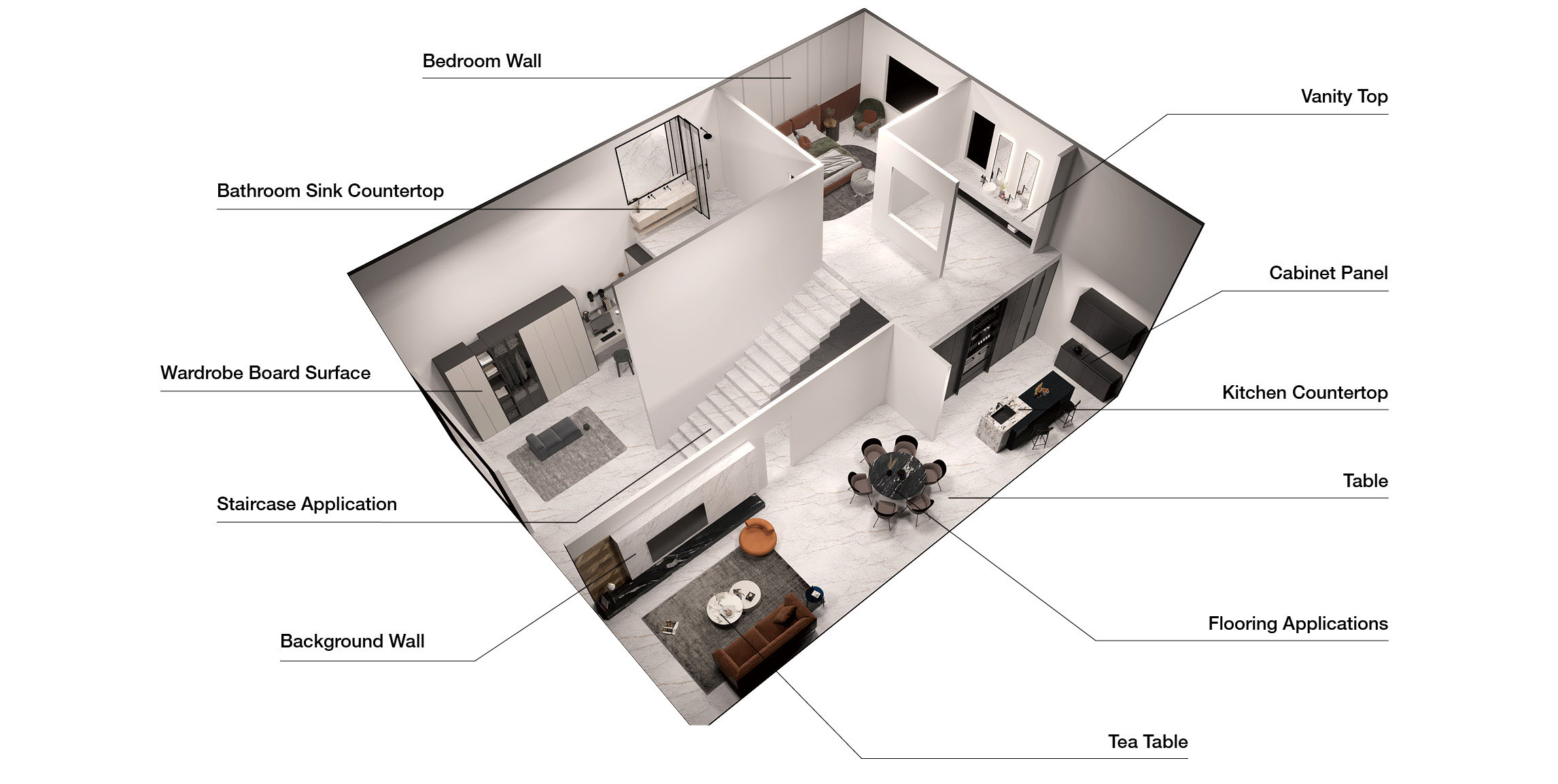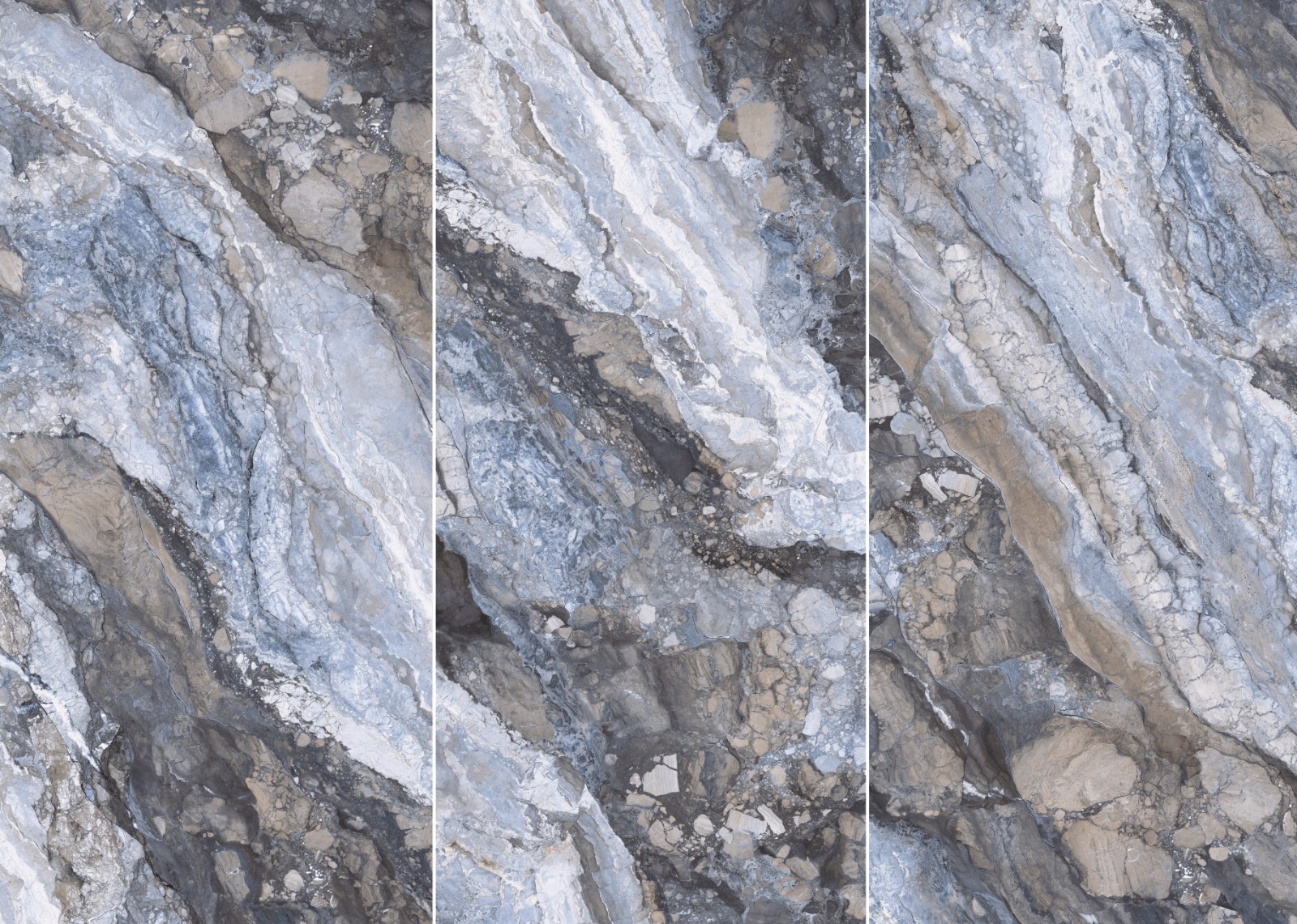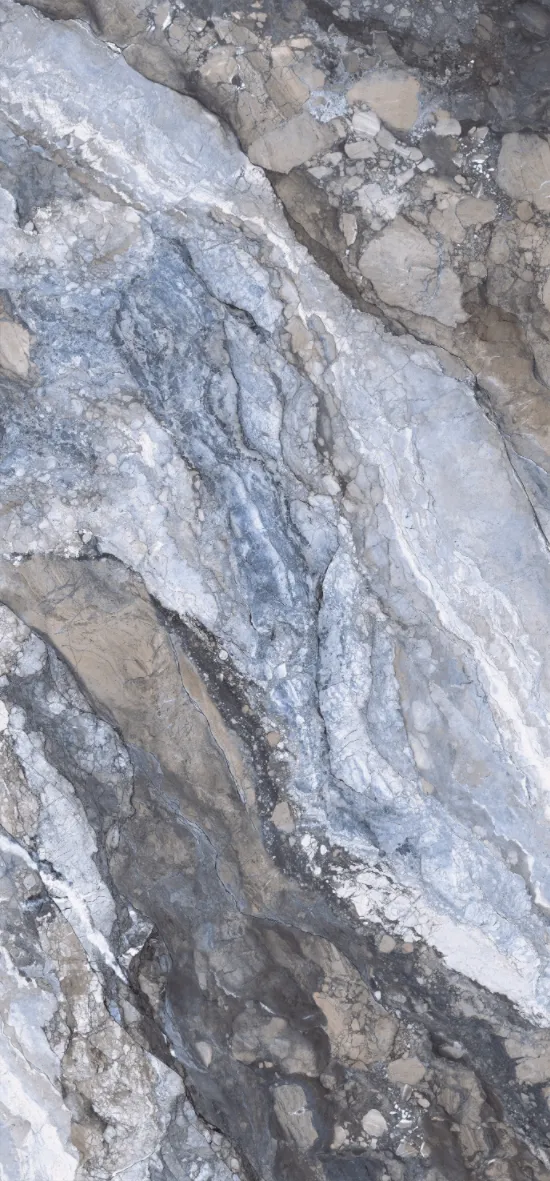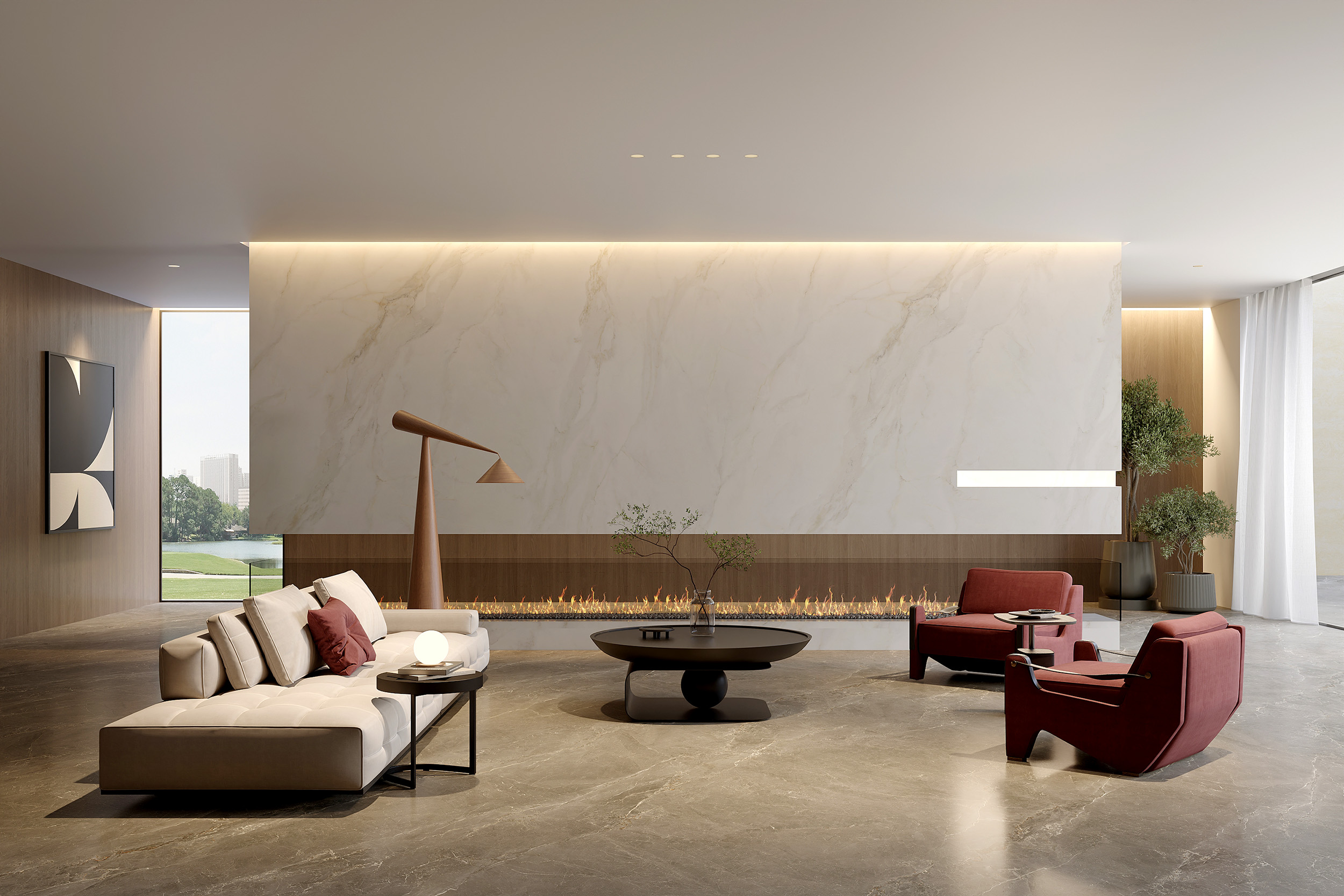In modern home renovations, bathrooms, as special spaces subject to high humidity and temperature, place stringent requirements on flooring materials. Choosing the right flooring not only impacts aesthetics but also safety and durability.
Quartz and sintered stone are two common high-end stone flooring materials, but which is better for the bathroom?
This article will compare the advantages of quartz and sintered stone flooring in bathroom applications, focusing on material properties, slip resistance, and water resistance, providing a professional reference for choosing a flooring material.

Quartz vs. Sintered Stone Flooring: Material Properties Comparison
Before choosing bathroom flooring, it's essential to understand the physical and chemical properties of the stone itself.
1. Quartz Material Characteristics
Quartz is a man-made stone made from natural quartz particles and a resin adhesive using a high-pressure process. Its key characteristics include:
• High Hardness: Quartz is hard and scratch-resistant.
• Smooth Surface: Highly aesthetically pleasing, with either a glossy or matte finish.
• Low Water Absorption: Resists moisture to a certain extent, but may still absorb and swell in prolonged high humidity environments.
• Chemical Resistance: Resists corrosion from general acids and alkalis, but is susceptible to discoloration or damage from strong acids or high temperatures.
2. Material Characteristics of Sintered Stone Flooring
Sintered stone flooring is a type of artificial stone flooring made by sintering natural mineral powder or granules at high temperatures. Its main characteristics include:
• High Hardness and Abrasion Resistance: The surface of sintered stone flooring is hard and scratch-resistant.
• High Temperature Resistance: Resists fading and deformation in extremely hot environments, making it suitable for the steamy environments of bathrooms.
• Stain Resistance: The surface is resistant to water and oil stains, making it easy to clean and maintain.
• UV Resistance: Resists discoloration even with long-term use, making it suitable for both indoor and outdoor use.
• Low Water Absorption: Resists almost no water absorption and is less likely to crack even in prolonged humid environments.
From a material perspective, sintered stone flooring is significantly superior to quartz in terms of heat resistance, scratch resistance, and stain resistance, making it more suitable for use in high-humidity and high-temperature environments such as bathrooms.

Bathroom Flooring Material Requirements
Before deciding whether quartz or sintered stone flooring is more suitable for a bathroom, it's important to understand the specific requirements for the flooring material in the bathroom environment:
• Slip resistance: Bathrooms often experience water stains, and a slippery floor can easily lead to slips and falls, compromising safety.
• Water resistance: Bathroom environments are humid, so flooring materials must have low water absorption and be waterproof to prevent cracking or swelling.
• Temperature resistance: Hot water vapor, floor heating, or high-temperature environments require temperature resistance.
• Stain resistance: Liquids like soap, shampoo, and cosmetics easily spill onto the floor, so the material must be easy to clean and resist staining.
• Maintenance ease: Bathrooms are frequently cleaned, so the flooring material needs to be easy to clean and wear-resistant to reduce long-term maintenance costs.
Combining these requirements, it can be seen that the material's physical properties, surface treatment, and stain resistance are key factors in determining the suitability of quartz or sintered stone flooring.
Comparison of Anti-Slip Performance
1. Quartz Anti-Slip Performance
Quartz flooring has a smooth, flat surface. High-gloss polishing can result in poor anti-slip performance. Bathrooms subject to constant water spray or splashing can make smooth quartz surfaces prone to slipping, necessitating additional anti-slip treatment or the installation of anti-slip mats.
2. Sintered Stone Anti-Slip Performance
Sintered stone floors can achieve a natural anti-slip effect through sandblasting, frosting, or matte finishes. This provides sufficient friction and safety even in wet and slippery conditions. Furthermore, the natural mineral texture of sintered stone floors contributes to their anti-slip properties, making them particularly suitable for use in bathrooms or public restrooms.
Conclusion: From a slip resistance perspective, sintered stone floors are more suitable for bathrooms.

Comparison of Water Resistance and Water Absorption
1. Quartz Water Absorption Performance
Quartz itself has a low water absorption rate, but its resin component is sensitive to high-temperature water vapor. Long-term exposure to high humidity may cause slight swelling or resin degradation, affecting its aesthetics and longevity.
2. Water Absorption of Sintered Stone Flooring
Sintered stone flooring is sintered at high temperatures to create a dense structure with extremely low water absorption, preventing moisture from penetrating. Even in bathroom environments with long-term use, it is less likely to crack or warp.
Conclusion: Sintered stone flooring is significantly more water-resistant than quartz, making it more suitable for bathrooms exposed to moisture.
High-Temperature Performance Comparison
1. Quartz's High-Temperature Resistance
Quartz withstands normal temperatures well, but in extremely hot environments (such as underfloor heating with high-temperature steam or prolonged hot water spray), the resin can soften or discolor, affecting the floor's lifespan and aesthetics.
2. Sintered Stone's High-Temperature Resistance
Sintered stone flooring is virtually unaffected by high temperatures and exhibits excellent high-temperature resistance. Even in bathroom environments with steam and hot water, it will not fade or warp, maintaining its smoothness and aesthetics over time.
Conclusion: Sintered stone flooring is significantly more heat-resistant than quartz, making it more suitable for bathroom environments.
Stain Resistance and Cleanability Comparison
1. Quartz Stain Resistance
Quartz has a smooth surface, but its resin composition easily absorbs oil and cosmetic residue. Cleaning requires specialized cleaning agents, as this can leave marks or discolor.
2. Sintered Stone Stain Resistance
Sintered stone floors have a dense, stain-resistant surface and are resistant to water, soap, and cosmetic residue. Daily cleaning requires only a damp cloth, making maintenance simple and convenient, ensuring long-lasting beauty.
Conclusion: Sintered stone floors are significantly superior to quartz in terms of stain resistance and cleanability, making them more suitable for bathrooms.

Maintenance Comparison
1. Quartz Maintenance
Quartz floors require protection from high temperatures and chemical corrosion, resulting in high maintenance costs. Prolonged exposure to hot water or chemical cleaning agents can cause discoloration, deformation, or cracking.
2. Sintered Stone Floor Maintenance
Sintered stone floors are wear-resistant, heat-resistant, and stain-resistant, and are virtually insensitive to cleaning agents and daily moisture. Simply clean with a mild detergent and a damp cloth, it's easy to maintain and offers long-lasting durability.
Conclusion: Sintered stone flooring is easier to maintain in the bathroom and offers lower long-term costs.
Quartz or Sintered Stone Flooring: A Comprehensive Comparison
| Features | Quartz Flooring | Sintered stone flooring |
| Hardness and wear resistance | High, scratch-resistant, but the resin is easily damaged | High scratch and abrasion resistance |
| Anti-slip properties | Glossy surface is slippery and requires anti-slip treatment | Naturally non-slip, safe in wet environments |
| Water resistance | Low water absorption, but may swell under prolonged high humidity | Extremely low water absorption, maintains deformation even after prolonged exposure to moisture |
| High temperature resistance | Resin components are susceptible to high temperatures | High temperature resistance and colorfastness |
| Stain resistance | Suitable for absorbing oil and cosmetic stains | Stain resistance and easy cleaning |
| Daily maintenance | High, requiring careful attention to chemicals and temperature | Low maintenance and easy cleaning |
| Applicable spaces | Used for standard bathrooms or dry and wet areas | Suitable for all bathrooms and high-humidity and high-temperature environments |
A comprehensive comparison reveals that sintered stone flooring offers advantages in the bathroom. Whether it's heat resistance, water resistance, stain resistance, or slip resistance, sintered stone flooring is more suitable for the specialized bathroom environment than quartz.
Which is better for the bathroom: quartz or sintered stone?
While quartz flooring is hard and aesthetically pleasing, it can easily fade or damage in high-temperature and high-humidity environments, lacks slip resistance, and has higher long-term maintenance costs.
Sintered stone flooring is heat-resistant, scratch-resistant, stain-resistant, and UV-resistant, with low water absorption and excellent slip resistance. It's suitable for long-term bathroom use and is easy and convenient to maintain.
Therefore, if safety, durability, and long-term maintenance are considered, sintered stone flooring is the best choice for bathroom flooring. Whether in a home bathroom or a public restroom, sintered stone flooring provides comfort, safety, durability, and long-lasting beauty.
How does WOWSLAB ensure fast delivery for international orders?
WOWSLAB, a professional Chinese supplier and manufacturer of marble slabs, offers efficient shipping and logistics solutions worldwide. We support bulk and wholesale purchases with competitive prices and factory-direct quotes. Our company ensures quality control before shipment, and our experienced team guides customers through order tracking, customs documentation, and installation advice. Buyers can also take advantage of discounts and promotions for large orders.


